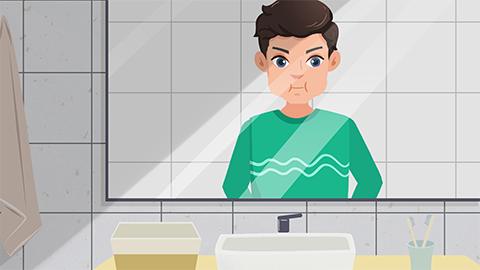What does it mean to have a nosebleed while brushing teeth in the morning, and what should I do?
Generally, nosebleeds during morning tooth brushing may be caused by improper brushing techniques, dry nasal mucosa at night, chronic rhinitis, deviated nasal septum, thrombocytopenia, or other reasons. If experiencing discomfort, timely medical consultation is recommended. Detailed analysis is as follows:
1. Improper Brushing Technique
Brushing too hard or using a toothbrush with stiff bristles may inadvertently irritate the mucous membrane in the front of the nasal cavity, leading to mucosal damage and blood vessel rupture. It is recommended to use a soft-bristled toothbrush and control the brushing force, avoiding excessive pressure. Pay attention to gentle movements while brushing, and try not to let the toothbrush touch the nasal area. If there is slight damage near the nasal entrance, warm water rinsing can be temporarily used to reduce local irritation.
2. Dry Nasal Mucosa at Night
During sleep, prolonged time in a relatively enclosed environment with poor air circulation can cause the nasal mucosa to lose moisture, becoming dry and fragile. Even minor stimulation during brushing might cause bleeding. Using a humidifier in the bedroom before sleep to maintain indoor humidity between 40% and 60% is recommended. A saline nasal spray can be used before sleep to clean the nasal cavity and keep the mucosa moist. Drinking adequate water at night can also help prevent dehydration-induced nasal mucosal dryness.

3. Chronic Rhinitis
The nasal mucosa remains in a state of chronic inflammation, causing congestion and swelling. The mucosal tissue becomes fragile and prone to rupture from minor vibrations or irritation during brushing, leading to bleeding. Symptoms often include nasal congestion and runny nose. Medications such as budesonide nasal spray, mometasone furoate nasal spray, and Tongqiao Biyan tablets can be used under medical guidance to reduce nasal inflammation. Maintaining nasal hygiene and avoiding nose picking is important. Regular nasal irrigation with saline solution is also recommended.
4. Deviated Nasal Septum
When the nasal septum is deviated to one side or has localized protrusions, the mucosa in the deviated area becomes thin and is chronically irritated by airflow and dust, making it prone to dryness and erosion. Vibration during brushing may trigger bleeding, and symptoms such as unilateral nasal congestion may also occur. If symptoms are mild, medications such as compound camphor nasal drops or erythromycin ointment may be used under medical guidance to keep the mucosa moist and prevent infection. If bleeding is frequent or nasal congestion is severe, surgical correction of the deviated nasal septum may be considered under medical advice.
5. Thrombocytopenia
A reduced platelet count leads to impaired clotting function. Even minor injuries to the nasal mucosa may result in prolonged bleeding, which can be triggered by brushing. Symptoms may also include skin bruising and gum bleeding. Prompt medical evaluation is necessary to identify the underlying cause and initiate treatment under medical supervision, such as using recombinant human thrombopoietin injection, aminopeptide tablets, or leucogen tablets to increase platelet count. Avoid strenuous activities in daily life to prevent injury-induced bleeding, and use a soft-bristled toothbrush with gentle brushing motions.
In daily life, maintain a light diet, consume more foods rich in vitamin C, such as oranges and spinach, to enhance mucosal repair capacity. Maintain regular sleep patterns and avoid staying up late.









